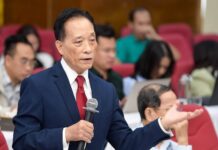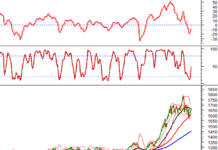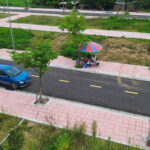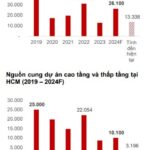The real estate market has recently shown positive signs with the early enforcement of three important laws, effective from 1/8/2024, six months earlier than initially planned. While the market has been vibrant in Hanoi, other localities have remained quiet. Amid the challenges faced by real estate businesses and investors being “stuck” in provincial markets, a recent proposal to tax the second home has received mixed reactions.
In fact, the idea of taxing the second home is not new and has been discussed since 2009. However, due to various reasons, it couldn’t be legalized until it was officially included in Resolution No. 18-NQ/TW issued in June 2022 by the National Assembly Standing Committee. Nevertheless, challenges arise in implementing the construction of regulations and policies to regulate the land market, specifically through imposing additional taxes on the use of land and ownership of assets on real estate from the second property onwards.
Specifically, many experts worry that if the tax on real estate is not carefully calculated and applied uniformly, it could have a reverse effect, leading to an increase in housing prices and making it more difficult for low and middle-income earners to access housing.
Lawyer Truong Thanh Duc from ANVI Law Firm expressed that we shouldn’t assume that since other countries have implemented property or real estate taxes, Vietnam should follow international practices. In reality, regarding land, people have been paying taxes on non-agricultural land use for many years. If there is an intention to tax houses, it is necessary to review the tax policies related to houses and land. More importantly, a database of real estate ownership is crucial for management purposes. “Even in Hanoi, many houses have incorrect or missing numbers, let alone proper tax management,” said Mr. Duc.
“It must be affirmed that the objective of taxing real estate and land use is to increase state budget revenue. As for the opinions that taxing real estate and land will curb speculation, I believe it goes against the nature of a market economy, where speculation is normal and healthy. A vibrant market should have buyers and sellers, and it’s the law of supply and demand that matters,” emphasized Mr. Duc.
From another perspective, Dr. Le Dang Doanh, Former Director of the Central Institute for Economic Management, suggested considering whether taxation would increase rental prices, as renters in Vietnam are mostly workers, freelancers, and students. Real estate is a complex field, and taxation should be approached comprehensively and cautiously to avoid unrealistic policies that may disappoint citizens and fail to meet their expectations.
To effectively tax assets, it is essential to have control over real estate transactions. As long as there are informal house and land transfers outside of banks and real estate exchanges, taxing assets will be incredibly challenging without proof of ownership. Without a comprehensive understanding of individuals’ real estate holdings, imposing taxes will only distort the real estate market further, making housing even more scarce and inaccessible to middle and lower-income earners.

Taxing real estate does not necessarily curb speculation or skyrocketing prices.
PSG.TS Dinh Trong Thinh, an economic expert, also noted that in some developed countries, taxing real estate does not necessarily curb speculation or skyrocketing prices. For example, in Singapore, property taxes are high, but when demand exceeds supply, real estate prices continue to rise.
Providing a detailed analysis, Mr. Thinh explained that taxation is a double-edged sword. Depending on the specific market, it can either facilitate or hinder its development. Singapore, being a country with limited land and a dense population, experiences an inevitable increase in real estate prices whenever new properties are introduced to the market. As a result, regardless of the tax rate, real estate prices will continue to climb. “When demand outstrips supply, buyers are willing to accept the imposed taxes. In fact, higher taxes may even drive up property prices,” asserted Mr. Thinh.
Mr. Thinh emphasized the importance of utilizing taxation as a tool to encourage market growth in a transparent and positive direction, rather than creating obstacles for the real estate market. He suggested that taxing real estate is just one of many measures to ensure the market’s sustainable and transparent development. The optimal solution is to accelerate digitalization and establish a comprehensive database of land and real estate asset values.
From another perspective, many owners of second homes argue that purchasing a piece of land already involves paying personal income tax and land use tax, not to mention creating job opportunities for brokers and helping sellers generate income, which is then reinvested into the economy. Building a house on that land contributes to the construction industry and boosts the consumption of materials like steel, wood, and interior design products.
Additionally, real estate serves not only as a place to live but also as a critical input for economic activities. For instance, a producer or business owner requires a second or subsequent property for their factory, store, or office. Imposing taxes on these properties indirectly increases the prices of the goods they sell, ultimately impacting consumers.
Looking abroad, China offers a cautionary tale of the pitfalls of rigidly applying tax rates to owners of second homes to curb rising prices. Specifically, at the end of 2017, China introduced the policy, “Houses are for living, not for speculation.” In major cities like Beijing, Shanghai, Shenzhen, and Chengdu, the government imposed strict regulations on the ownership of second homes. For instance, buyers of a second home had to make a down payment of 60-85% of the property value, and taxes were significantly higher for the second and subsequent properties.
Furthermore, Beijing and Shanghai had stringent household registration requirements for approving home purchases. The city of Tangshan in northeastern China mandated that homebuyers retain ownership of their properties for a minimum of 3.5 years…
However, as of now, China’s real estate crisis has lasted for many years, wiping out approximately $18 trillion from household wealth, resulting in 18 million job losses, and causing a decline in consumer confidence and demand for various products like steel. Consequently, China has unveiled an unprecedented bailout package for its real estate market, officially easing restrictions on the purchase of second homes.
Specifically, at a press conference on September 24, Pan Gongsheng, Governor of the People’s Bank of China (PBOC), announced that the country would reduce borrowing costs for mortgage loans worth $5.3 trillion and relax restrictions on the purchase of second homes. The down payment requirement for the second home has been lowered from 25% to 15%.
Returning to the domestic context, according to Mr. Le Hoang Chau, Chairman of the Ho Chi Minh City Real Estate Association, it is crucial to untangle legal issues and increase supply to regulate the market’s healthy and sustainable development, including land prices following market laws. Utilizing the balance of supply and demand is the most effective tool to control real estate prices before resorting to policy tools like real estate taxes.
The Latest Land Price List: What You Need to Know
The Ministry of Construction has assessed that the application of the new land price framework will have a ripple effect, triggering a surge in the property and housing market. Experts predict a 15-20% increase in prices compared to pre-framework levels, a significant jump that will have far-reaching implications for the industry and consumers alike.
“Speculators Driving Up Land Prices in Hanoi: The Capital’s Fake Land Frenzy”
“A recent Techcombank Priority report highlights the need for caution among individual investors when it comes to land price appraisal before making investment decisions. The report underscores the importance of diligent research and prudent evaluation of land values to mitigate potential risks and make informed choices.”
“Vietnamese Contractors Going Global: Coteccons Lands VinFast Project in India, Hoa Binh Secures 5 Overseas Projects Worth $72 Million”
“The wood and furniture businesses are striving to venture overseas, seeking new horizons and untapped markets. With a keen eye for expansion, these enterprises are embarking on a journey to globalize their operations and tap into international demand.”













































